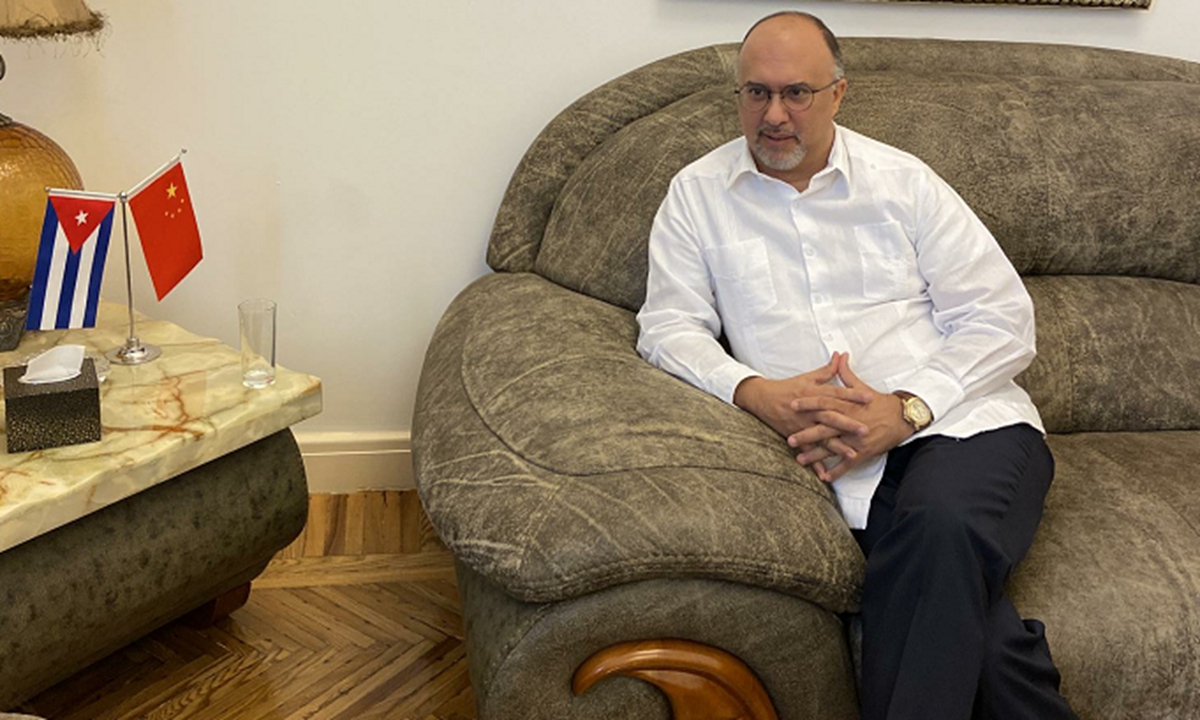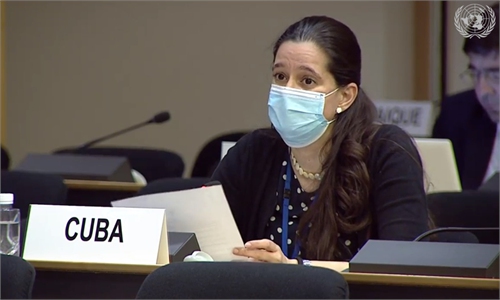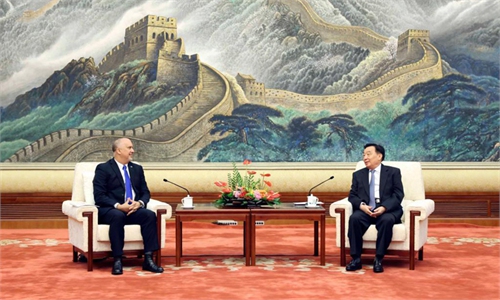IN-DEPTH / DIPLOMATIC CHANNEL
World sees opportunities from China’s unifying role, as CPC proves socialism efficacy despite US enmity: Cuban Ambassador
Shared progressive future
Editor's Note:
This year marks the 100th anniversary of the founding of the Communist Party of China (CPC). As a socialist brother to China, how does Cuba evaluate the performance of the CPC? What references does Cuba find valuable to borrow from the CPC in building a prosperous socialist country? Global Times reporters Xie Wenting and Bai Yunyi (GT) interviewed Cuban Ambassador to China Carlos Miguel Pereira (Pereira) on those topics.

Pereira: The Communist Party of China (CPC) has played an important role in the process of territorial reunification and China's sustainable and peaceful development. Under the leadership of Mao Zedong, the CPC established a New China in 1949.
The trajectory of the CPC, as the leading political force of the Chinese nation, has been upward. The CPC has demonstrated its ability to learn from past experiences and the lessons of each historical period while actively building socialism with Chinese characteristics.
The reform and opening-up was an important boost to China's development and international prestige. In the design and implementation of the reform and opening-up, the CPC has not limited itself to specific adjustments or the use of conventional instruments of economic policy. The reform and opening-up served as a driving force for the development of socialism with Chinese specifications.
The CPC now achieves its first centenary with proven leadership and rootedness within the Chinese society. In each historical period, it has known how to bring together and lead the country, always starting from the socialist principle of focusing on the well-being of the population as a whole, leading the country along the path of economic and social development in an integral way.
From the very beginning of the epidemic, and in its most critical stage, the prestige, moral authority, and trust of its population in the CPC was evident. Its ability to analyze the situation in a thorough and pragmatic way at the moments of great uncertainty and the ability to turn challenges into opportunities is admirable.
In the most recent stage, we have observed how the CPC has become a reference for the world in the fight against poverty and the COVID-19 global pandemic. These issues are solved through the efforts made by Party officials and their constant dialogue with Chinese society.
At the international level, the rise of the CPC as a political organization that leads through consensus in favor of a more just, equitable, and multilateral world is unquestionable.
Cuba hopes the celebrations for the centenary mark a new stage for the strengthening of bilateral ties between our two nations. The relations between both nations will continue to be the cornerstone of bilateral ties.

Pereira: The CPC has proven that it is possible to build socialism even in the midst of adversity.
The growing presence of China on the international stage is viewed by the United States and some of its Western allies as a powerful challenge to their hegemony.
In fact, it is a fairly widespread political practice that some Western powers classify the actions carried out by China at the international level as a "Chinese threat." In fact, it's the strong rise of China in the international arena, its consolidation as the second-largest global economy, and the contributions of China to world peace and an increasingly equitable global development that make said countries nervous.
In keeping up with its aspiration to build a community with a shared future for mankind, China and the CPC advocate multilateralism, the basic principles of international law, solidarity, and the prioritization of cooperation on the international stage. In addition, like Cuba, China maintains its firm rejection of unilateralism and hegemony, unilateral sanctions, protectionism, and double standards. The positions taken by China, and its approach to take full advantage of the benefits of globalization, have earned it a majority of international support.
Cuba maintains its invariable support for China and rejects the political actions taken by the US and other countries which are aimed at meddling in the internal affairs of China. Cuba firmly supports the one-China principle, and firmly supports China on issues related to Hong Kong, Xinjiang, Taiwan, and Tibet.

Pereira: It's well known that Western politicians and analysts always tried to affirm the benefits of their bourgeois liberal democracy and they want all nations to assume a single political system regardless of their social and cultural contexts.
For these people, notions such as one-party socialist democracy or the socialist rule of law, which Cuba and China share, contradict many of the concepts associated with Western democratic theory.
Both Cuba and China share the vision of building a socialism based on each country's own characteristics. The concrete progress made by Cuba in the process of updating its socio-economic model has made it possible to delineate the bases for the medium and long-term development of Cuba to develop prosperous and sustainable socialism. Cuba will not give up in its efforts to establish itself as an independent, democratic, prosperous, and sustainable socialist nation despite the incessant and unprecedented hostility of the US government and the sanctions imposed on us.
The Communist Party of Cuba and the CPC maintain a high level of political dialogue and the interest in deepening the exchange of experiences in various fields including training officials and fighting against corruption. We highly value the CPC's experiences in economic planning and management.
The positive response of both countries to COVID-19 has shown the effectiveness of the socialist practice of prioritizing people, solidarity, and cooperation to defeat this common enemy to all humanity, which is the pandemic. The firm adherence to socialism has allowed the two countries to work toward improving the quality of life and preserving the health of their respective populations.
GT: The competition and rivalry between China and the US is intensifying. Do you think there will be a new Cold War? What is Cuba's position in the face of this potential Cold War?
Pereira: The current scenario of uncertainties and prevalence of hegemonic practices in the West, particularly by countries like the US, in parallel with the rise of China, a socialist country with a Communist Party in power, promote a new type of international relations and alternative globalization. We consider that the evolution of this current situation will mark the future of international relations, and before this, the different actors of the international community have the duty to reinforce multilateralism and the role of the United Nations in favor of sustainable and peaceful development.
For developing countries like Cuba, we see opportunities because of China's unifying role to advance a progressive global agenda. In the midst of the global challenge posed by the current pandemic that plagues the world, Cuba and China have taught the world a lesson about the importance of solidarity and cooperation over meanness, arrogance, and political manipulation.
Cuba appreciates the firm decision of the Chinese authorities to provide us with all possible support in the difficult and complex situation marked by the unprecedented hostility of the US government against our country. At the same time, in the recent telephone call between the presidents of both countries, the will to advance the implementation of the consensus has been ratified, which includes strengthening our communication on issues on the international agenda.

Pereira: Cuba and China have a common goal which is to raise the population's living standard, but economic reforms in both countries have their own peculiarities given differences in the economic, social, and political conditions. The frequent exchange of experiences in the past between the two countries has served to advance their respective processes of socialist construction with their own characteristics.
The experiences accumulated by China in its reform and opening-up process have been important references for updating the Cuban economic model.
Cuba and China are two developing socialist countries, with both similarities and important differences. Cuba is geographically close to the United States, the world's largest economic power, which has kept Cuba blocked and under siege for more than 60 years, impacting the pace of the transformation process and access to important financial and technological resources essential to its development.
China has endorsed the socialist market economy and Cuba takes the market into account while persisting in strategic planning mechanisms. In both cases, the important weight of the state sector is recognized as the basis of the economic system, while the legal and orderly development of non-state forms of ownership is also recognized and promoted.
Today both countries apply methods based on theoretical and practical experiences, such as the creation and development of special economic zones, industrial and technological parks, and flexible policies for attracting foreign investment among other key strategies. It is not a matter of copying or extrapolating experiences in one way or another, but of finding the appropriate solutions that each country demands according to its needs and national complexities.
Cuba and China are common references in the process of socialist construction. Each country has to learn from the other. In the case of Cuba, the advances of China in the sectors of industry, logistics, communications, infrastructure, wholesale, and retail distribution to markets, among others, constitute topics of great interest. In the case of China, Cuba's experiences in social matters and biotechnological innovation are equally valuable given the advances made by our country in health, education, and biotechnology among other strategic sectors.
This year marks the 100th anniversary of the founding of the Communist Party of China (CPC). As a socialist brother to China, how does Cuba evaluate the performance of the CPC? What references does Cuba find valuable to borrow from the CPC in building a prosperous socialist country? Global Times reporters Xie Wenting and Bai Yunyi (GT) interviewed Cuban Ambassador to China Carlos Miguel Pereira (Pereira) on those topics.

Cuban Ambassador to China Carlos Miguel Pereira Photo: Xie Wenting/GT
GT: How do you evaluate the achievements of the Communist Party of China (CPC) and the role it has played on the international stage over the past 100 years?Pereira: The Communist Party of China (CPC) has played an important role in the process of territorial reunification and China's sustainable and peaceful development. Under the leadership of Mao Zedong, the CPC established a New China in 1949.
The trajectory of the CPC, as the leading political force of the Chinese nation, has been upward. The CPC has demonstrated its ability to learn from past experiences and the lessons of each historical period while actively building socialism with Chinese characteristics.
The reform and opening-up was an important boost to China's development and international prestige. In the design and implementation of the reform and opening-up, the CPC has not limited itself to specific adjustments or the use of conventional instruments of economic policy. The reform and opening-up served as a driving force for the development of socialism with Chinese specifications.
The CPC now achieves its first centenary with proven leadership and rootedness within the Chinese society. In each historical period, it has known how to bring together and lead the country, always starting from the socialist principle of focusing on the well-being of the population as a whole, leading the country along the path of economic and social development in an integral way.
From the very beginning of the epidemic, and in its most critical stage, the prestige, moral authority, and trust of its population in the CPC was evident. Its ability to analyze the situation in a thorough and pragmatic way at the moments of great uncertainty and the ability to turn challenges into opportunities is admirable.
In the most recent stage, we have observed how the CPC has become a reference for the world in the fight against poverty and the COVID-19 global pandemic. These issues are solved through the efforts made by Party officials and their constant dialogue with Chinese society.
At the international level, the rise of the CPC as a political organization that leads through consensus in favor of a more just, equitable, and multilateral world is unquestionable.
Cuba hopes the celebrations for the centenary mark a new stage for the strengthening of bilateral ties between our two nations. The relations between both nations will continue to be the cornerstone of bilateral ties.

A view of Havana, capital of Cuba Photo: VCG
GT: Some Western politicians seem to be very concerned about China's development, accusing China and the CPC of being "threats" to the current world order. What is your view?Pereira: The CPC has proven that it is possible to build socialism even in the midst of adversity.
The growing presence of China on the international stage is viewed by the United States and some of its Western allies as a powerful challenge to their hegemony.
In fact, it is a fairly widespread political practice that some Western powers classify the actions carried out by China at the international level as a "Chinese threat." In fact, it's the strong rise of China in the international arena, its consolidation as the second-largest global economy, and the contributions of China to world peace and an increasingly equitable global development that make said countries nervous.
In keeping up with its aspiration to build a community with a shared future for mankind, China and the CPC advocate multilateralism, the basic principles of international law, solidarity, and the prioritization of cooperation on the international stage. In addition, like Cuba, China maintains its firm rejection of unilateralism and hegemony, unilateral sanctions, protectionism, and double standards. The positions taken by China, and its approach to take full advantage of the benefits of globalization, have earned it a majority of international support.
Cuba maintains its invariable support for China and rejects the political actions taken by the US and other countries which are aimed at meddling in the internal affairs of China. Cuba firmly supports the one-China principle, and firmly supports China on issues related to Hong Kong, Xinjiang, Taiwan, and Tibet.

Passengers sit on-board a Chinese-designed and manufactured train in Havana on July 13, 2019. It was the first time since 1975 that Cuba has purchased new railway coaches, which has provided an important underpinning for the modernization of Cuba's railway system in recent years. Photo: Xinhua
GT: Some Western politicians and analysts claimed that countries like China and Cuba are "undemocratic." How would you respond to such accusations?Pereira: It's well known that Western politicians and analysts always tried to affirm the benefits of their bourgeois liberal democracy and they want all nations to assume a single political system regardless of their social and cultural contexts.
For these people, notions such as one-party socialist democracy or the socialist rule of law, which Cuba and China share, contradict many of the concepts associated with Western democratic theory.
Both Cuba and China share the vision of building a socialism based on each country's own characteristics. The concrete progress made by Cuba in the process of updating its socio-economic model has made it possible to delineate the bases for the medium and long-term development of Cuba to develop prosperous and sustainable socialism. Cuba will not give up in its efforts to establish itself as an independent, democratic, prosperous, and sustainable socialist nation despite the incessant and unprecedented hostility of the US government and the sanctions imposed on us.
The Communist Party of Cuba and the CPC maintain a high level of political dialogue and the interest in deepening the exchange of experiences in various fields including training officials and fighting against corruption. We highly value the CPC's experiences in economic planning and management.
The positive response of both countries to COVID-19 has shown the effectiveness of the socialist practice of prioritizing people, solidarity, and cooperation to defeat this common enemy to all humanity, which is the pandemic. The firm adherence to socialism has allowed the two countries to work toward improving the quality of life and preserving the health of their respective populations.
GT: The competition and rivalry between China and the US is intensifying. Do you think there will be a new Cold War? What is Cuba's position in the face of this potential Cold War?
Pereira: The current scenario of uncertainties and prevalence of hegemonic practices in the West, particularly by countries like the US, in parallel with the rise of China, a socialist country with a Communist Party in power, promote a new type of international relations and alternative globalization. We consider that the evolution of this current situation will mark the future of international relations, and before this, the different actors of the international community have the duty to reinforce multilateralism and the role of the United Nations in favor of sustainable and peaceful development.
For developing countries like Cuba, we see opportunities because of China's unifying role to advance a progressive global agenda. In the midst of the global challenge posed by the current pandemic that plagues the world, Cuba and China have taught the world a lesson about the importance of solidarity and cooperation over meanness, arrogance, and political manipulation.
Cuba appreciates the firm decision of the Chinese authorities to provide us with all possible support in the difficult and complex situation marked by the unprecedented hostility of the US government against our country. At the same time, in the recent telephone call between the presidents of both countries, the will to advance the implementation of the consensus has been ratified, which includes strengthening our communication on issues on the international agenda.

Local residents ride bicycles to protest the nearly 60-year US embargo against Cuba in Santa Clara, Cuba on April 25. Photo: Xinhua
GT: Both China and Cuba are undertaking their own economic reform. In your opinion, what are the most important similarities and differences between the reforms of Cuba and China? In which sectors will one be able to learn from the other respectively?Pereira: Cuba and China have a common goal which is to raise the population's living standard, but economic reforms in both countries have their own peculiarities given differences in the economic, social, and political conditions. The frequent exchange of experiences in the past between the two countries has served to advance their respective processes of socialist construction with their own characteristics.
The experiences accumulated by China in its reform and opening-up process have been important references for updating the Cuban economic model.
Cuba and China are two developing socialist countries, with both similarities and important differences. Cuba is geographically close to the United States, the world's largest economic power, which has kept Cuba blocked and under siege for more than 60 years, impacting the pace of the transformation process and access to important financial and technological resources essential to its development.
China has endorsed the socialist market economy and Cuba takes the market into account while persisting in strategic planning mechanisms. In both cases, the important weight of the state sector is recognized as the basis of the economic system, while the legal and orderly development of non-state forms of ownership is also recognized and promoted.
Today both countries apply methods based on theoretical and practical experiences, such as the creation and development of special economic zones, industrial and technological parks, and flexible policies for attracting foreign investment among other key strategies. It is not a matter of copying or extrapolating experiences in one way or another, but of finding the appropriate solutions that each country demands according to its needs and national complexities.
Cuba and China are common references in the process of socialist construction. Each country has to learn from the other. In the case of Cuba, the advances of China in the sectors of industry, logistics, communications, infrastructure, wholesale, and retail distribution to markets, among others, constitute topics of great interest. In the case of China, Cuba's experiences in social matters and biotechnological innovation are equally valuable given the advances made by our country in health, education, and biotechnology among other strategic sectors.



